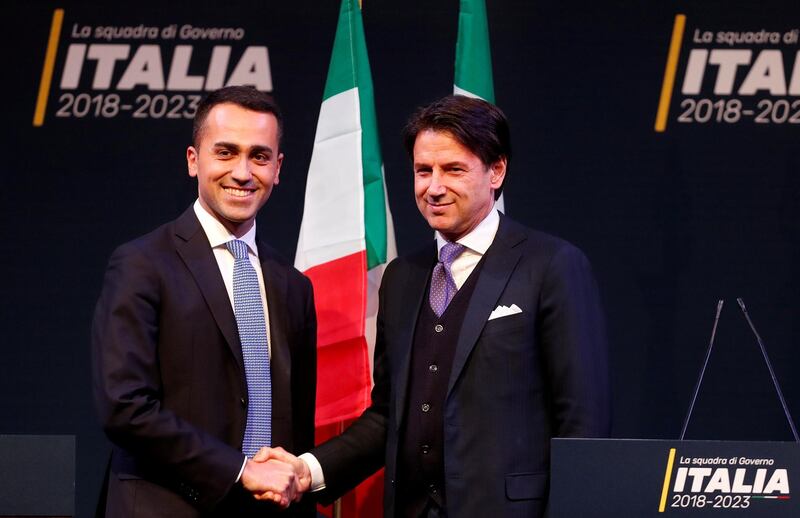Italy edged toward its first populist government on Monday as the eurosceptic Five Star Movement and the right-wing Anti-immigration League indicated a law professor with no political experience was their pick to become the country’s next premier.
Neither Five Star leader Luigi Di Maio nor League leader Matteo Salvini named Giuseppe Conte as their choice after closed-door meetings with president Sergio Mattarella.
But in a breach of protocol, Mr Di Maio later identified Mr Conte to reporters outside the Quirinal presidential palace and posted his name on the movement’s popular blog.
“Giuseppe Conte will be a political premier on a political government, indicated by two political forces that include political figures,” Mr Di Maio wrote on the blog.
Virtually unknown in Italian political circles and with the general public, Mr Conte teaches private law at the University of Florence, where his colleagues have a good opinion of him.
He was first contacted by Five Star several months ago, when they offered him the position of minister of public administration if they triumphed in the election.
But as it appeared that no one from either Five Star or the League would be acceptable to the other party as premier, Mr Conte's name came up for the top job.
However, he will wield little actual power in the role, will not appoint ministers to his cabinet and will rubber-stamp decisions taken by the coalition partners.
The consultations with the president could be the last ones before a government is formed, 11 weeks after the general election left Italy with a hung parliament.
It is up to president Mattarella to say whether he accepts Mr Conte as premier-designate. If the president consents, the new PM would bring a list of Cabinet members for the president’s approval, and the government would face confidence votes in both houses of parliament.
The prospect of a Five Star-League government weighed heavily on markets and on Italy’s European allies. The cost of borrowing to fund Italy’s persistently high public debt rose on Monday to the highest levels in nine months and the Milan stock market was trading down 1.5 per cent.
France’s economics minister has already sounded an alarm that the eurozone’s financial stability could be threatened if a populist government blows Italy’s deficit commitments.
“If the new government takes the risk of not respecting its commitments on debt, the deficit, but also on consolidation of banks, then the entire financial stability of the eurozone will be threatened,” Bruno Le Maire told the Cnews television channel on Sunday.
Most worrying to financial markets is the two parties’ platform, unveiled last week. It includes a rollback on pension reform, a minimum salary for struggling Italians and the introduction of a flat tax, which will contribute to a large fiscal expansion that economists and EU policymakers worry will increase the country’s debt burden.
The programme also introduces a tougher stance on deporting migrants and calls for a better dialogue with Russia on economic and foreign policy matters, while maintaining its trans-Atlantic alliance.
Mr Di Maio assured voters that the government would find the money to pay for social programmes and tax cuts, both through investments and in upcoming negotiations in Brussels on the European Union’s seven-year budget cycle, but neither the markets nor European partners have been assuaged.
A Five Star-League government would have a very thin majority of just over 50 per cent of parliamentary seats. Mr Salvini ran in the election as part of a right-wing coalition including Silvio Berlusconi’s Forza Italia, but Mr Berlusconi opposes Five Star and says he will not support them in a confidence vote.






